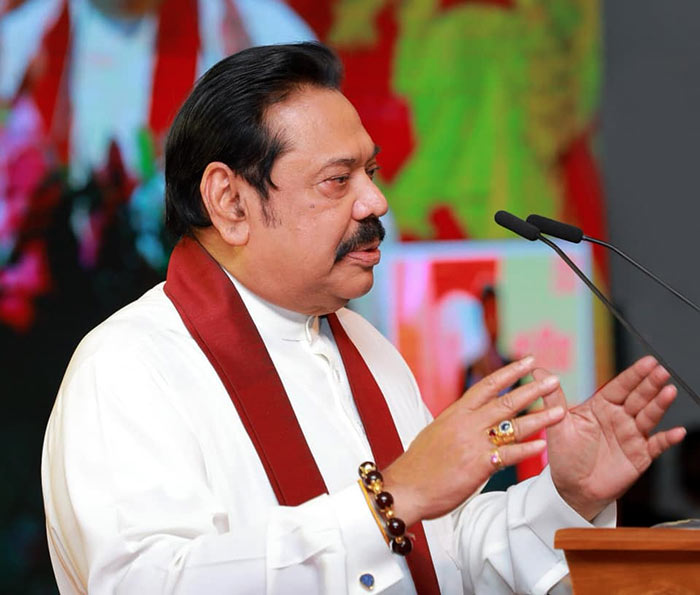Committed to a people-centred economy – Prime Minister

The present Government is committed to creating a people-centered economy, Prime Minister Mahinda Rajapaksa said yesterday speaking briefly after assuming duties as the Finance Minister.
The Prime Minister was also appointed as the Finance, Economic Affairs, Policy Development, Buddha Sasana, Cultural, Water Supply & Urban Development, and Housing Facilities Minister in the interim cabinet appointed by President Gotabaya Rajapaksa.
He further said that: “All the plans and policies that are needed to rebuild the country’s economy have already been prepared and now the government is in the process of preparing an organizational structure to implement those plans to provide relief for the people who suffered a lot due to economic-pressures. The President has also taken measures to implement the plans mentioned in his policy document to achieve the country’s long-term financial goals.”
The Prime Minister charged that the country’s state sector was weakened due to the activities of the Financial Crimes Investigation Division (FCID). Public servants were reluctant to take the correct decisions due to the FCID and he pledged to safeguard the public servants through new laws in the future.
Recalling the economic situation that prevailed in the country before 2015, Prime Minister Rajapaksa
said the country’s economy recorded a growth rate of 6.8 percent by 2014 and the economy grew from 24 billion US dollars in 2005 to 79 billion US dollars by 2014. The per capita income grew three fold from 1,241 dollars in 2005 to 3,654 dollars in 2014. Even at the height of the war the average growth rate was 6 percent. Inflation was maintained at a low average of 6 percent during the five years from 2010 to 2014. The US Dollar was Rs.131.05 by the end of 2014. It had been held steady at Rs. 127-131 from 2011 to 2014.
“There was a steady increase in foreign reserves from 2,735 million dollars in 2005 to a record 8,208 million dollars by the end of 2014. Government expenditure as a percentage of the GDP was 24.3% in 2006 and remained at an average of 23.8% during the war years up to 2009. From 2010 onwards there was a steady decline in Government expenditure year after year until it was reduced to 18.2 percent in 2014. Government debt as a percentage of GDP was 90.6 percent in 2005 when I assumed power and this too was reduced every year till it reached 75.5 percent in 2014. The foreign debt component of the total Government debt was 39 percent in 2005 and this was reduced every year until it reached 31.8 percent in 2014. Interest rates were held steady at around 7 to 9 percent from 2010 to 2014. When I handed over power to a new Government, the economy was on a very sound footing and the country as a whole was a single work site,” the Prime Minister said.
He further said that during the previous regime, the country’s economy was weakened and both investors and the people completely lost confidence in the government. The interest rate was doubled. Inflation doubled. Foreign reserves were reduced.The tourism sector was also badly affected due to the Easter Sunday terror attacks. Contractors and businessmen went bankrupt. Welfare activities were completely politicized. All possible measures were taken to sweep the Central Bank bond scam under the carpet.
“People who voted for President Gotabaya Rajapaksa expect a fast track economic development. President Gotabaya Rajapaksa’s government will never break the pledges given to the people,” he added.
(Source: Daily News – By Ishara Mudugamuwa)
Latest Headlines in Sri Lanka
- Defence Secretary inspects NFTH following SLAF takeover February 23, 2026
- Sri Lanka Navy ship P628 begins historic 14,775 nautical mile voyage to Sri Lanka February 23, 2026
- Sri Lanka Police arrest suspects in major fraud case impersonating officers February 23, 2026
- Oxford Union cancels Namal Rajapaksa speech after student opposition February 23, 2026
- 100,000 Litro gas cylinders to be released today to ease shortages in Sri Lanka February 23, 2026



Excellent words, my dear Leader,
But do you know what’s to be done?
Where is Viyath Maga, my dear Leader?
Where is the free fertilizer?
Yeah David,
One week in power; nothing done. Pohottu still celebrating victory with kiribath in the streets.
World oil prices sky rocketing and SL’s Minister wishes to demolish the pricing formula.
Fuel prices will go through the roof.
All consumer items have increased in price.
Yahapalana taxes still valid.